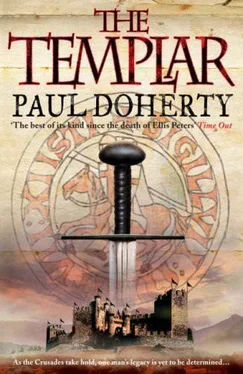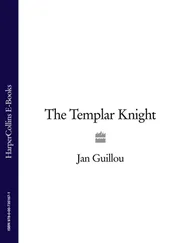P. Doherty - The Templar
Здесь есть возможность читать онлайн «P. Doherty - The Templar» весь текст электронной книги совершенно бесплатно (целиком полную версию без сокращений). В некоторых случаях можно слушать аудио, скачать через торрент в формате fb2 и присутствует краткое содержание. Год выпуска: 2010, ISBN: 2010, Издательство: Minotaur Books, Жанр: Исторические приключения, на английском языке. Описание произведения, (предисловие) а так же отзывы посетителей доступны на портале библиотеки ЛибКат.
- Название:The Templar
- Автор:
- Издательство:Minotaur Books
- Жанр:
- Год:2010
- ISBN:9780312576837
- Рейтинг книги:5 / 5. Голосов: 1
-
Избранное:Добавить в избранное
- Отзывы:
-
Ваша оценка:
- 100
- 1
- 2
- 3
- 4
- 5
The Templar: краткое содержание, описание и аннотация
Предлагаем к чтению аннотацию, описание, краткое содержание или предисловие (зависит от того, что написал сам автор книги «The Templar»). Если вы не нашли необходимую информацию о книге — напишите в комментариях, мы постараемся отыскать её.
The Templar — читать онлайн бесплатно полную книгу (весь текст) целиком
Ниже представлен текст книги, разбитый по страницам. Система сохранения места последней прочитанной страницы, позволяет с удобством читать онлайн бесплатно книгу «The Templar», без необходимости каждый раз заново искать на чём Вы остановились. Поставьте закладку, и сможете в любой момент перейти на страницу, на которой закончили чтение.
Интервал:
Закладка:
Firuz and his wife lived in one tower, his kinsmen, servants and retainers in the other on the far side of the postern gate. The interior of the tower was very similar to those of Compiègne: rough, undressed stone with a spiral staircase leading to the upper floors. Nevertheless the chambers themselves were splendid. The walls, plastered and lime-washed, were hung with rose-coloured, silver-tasselled tapestries and brilliantly embroidered cloths, whilst woollen rugs lay strewn across the floors. All the windows on the inside were glass-filled; those on the outside, overlooking the walls, were covered with wooden shutters or strips of hardened horn. Candlesticks, spigots and lantern horns provided light, whilst copper braziers gave off perfumed warmth.
Asmaja, Firuz’s wife, welcomed them with goblets of honey mead. She was truly beautiful: a close-fitting white veil framed a delicate, sensitive face, pale-skinned with lustrous eyes and rose-bud lips. Firuz clearly adored her. He immediately invited her and his new guests on to the dais of the main chamber. They sat on cushions around a low table. Servants brought platters of pitta bread, fruits, dried meats and delicious-tasting wines. Firuz, who was not a Muslim, openly rejoiced in feasting his guests; Baldur was more circumspect and frugal. Theodore acted the relieved man, happy at his reception by Yaghi Siyan. Simeon and Imogene remained silent; the latter, her precious box close to her, still looked sullen and petulant. Eleanor felt exhausted and dirty after the previous night’s imprisonment. She was desperate for sleep but determined to remain vigilant.
Firuz, under the influence of the wine, explained how Theodore would join him in securing the Twin Sisters tower and advising him on what siege machinery the Franks might bring up against them. Apparently his home was also to be their prison. Apologetically he explained how, for the time being, his guests, under pain of immediate death, were not allowed to leave the vicinity of the Twin Sisters for the city markets or bazaars, whilst they were certainly not to approach any of the main gates. Theodore, munching from his tray of diced lamb and vegetables, nodded understandingly and the conversation moved on. Eleanor, tired though she was, became distracted. At first she thought it was her own weariness, her bleary eyes, yet she was sure she caught a loving glance pass between Asmaja and Baldur. She lowered her head and mentally recited the Confiteor, an act of contrition for her sins and wayward thoughts. Yet as the meal continued, she glimpsed similar glances between the pair. Firuz, flushed with wine, remained totally oblivious, yet to Eleanor, his wife seemed deeply smitten with the handsome captain of Turcopoles.
The meal over, Firuz and Baldur wished to discuss things amongst themselves. Theodore, Eleanor and the rest were taken up to the highest floor of the tower, the staircase outside it leading through a narrow door on to the crenellated fighting platform. The chamber itself was comfortable, with pegs on the walls for their clothes, and chests and coffers for their other belongings. Servants busied themselves, and eventually four straw-filled palliasses lay about the room. Embroidered cloths hung against the walls, whilst rugs, shutters and bronze braziers kept out the cold. A wooden lavarium provided a bowl and water jug. Theodore, finger to his lips, indicated that they should remain silent whilst he loudly commented on how comfortable the chamber was and how, living at the top of tower, they would be more secure.
‘And more easily guarded!’ Eleanor whispered.
Once they had unpacked and made themselves comfortable, they went across to the basement of the other tower to wash and change their clothes. Afterwards they gathered in a circle in their own chamber. Theodore had inspected everything carefully, and had found no eyelets or peepholes in the wall, whilst the door was of thick, strong oak. They were safe. At first they had to listen to Imogene’s hiss of hateful words, her fury at being taken away, her desire to return. Theodore calmed her, relaying what Yaghi Siyan had said whilst reminding her how fortunate she was. If Antioch fell to the Army of God, she would be safe. If the Army of God withdrew, they could all easily slip out amidst the joyful celebrations of the city. Moreover, if they had stayed in the camp, they could starve, die in the fighting or run the risk of even being ejected from the camp. Imogene seemed satisfied. Theodore pressed them all not to ask questions; their task was not to discover spies but to find a way for the Army of God to enter Antioch. Eleanor described what she had seen pass between Baldur and Asmaja. Theodore chewed on the corner of his lip, narrowed his eyes and told her to watch further. For the rest, he advised, they must only wait and see.
So, in that freezing January, the Year of Our Lord 1098, they settled down in the tower of the Twin Sisters in Antioch. Theodore joined the garrison, proving himself to be a skilled adviser, impressing everyone with his expertise. Eleanor and Imogene helped with household tasks. Theodore asked Simeon to tutor both himself and his ‘wife’ in chancery skills, declaring that he wished to extend his education. In many ways it was a halcyon existence compared with the horrors of the camp beyond Antioch. They were cut off from the siege but, through Firuz, discovered what was happening outside. Matters were turning from bad to worse in the Army of God. Rain beat through the fabric of the tents, rusting the armour, softening the bowstrings. The ground beneath became churned, the mud working its way up through the rugs and blankets on which the besiegers slept. Nature seemed to be against the Franks. One night the earth shook with a heart-chilling tremor. Pavilions toppled down. Men who ran out into the open were thrown off their feet. Fissures and cracks appeared in the earth. As the Franks gathered in groups to see what was happening, fresh horrors terrified them. In the northern sky plumes of flame shot up amongst the stars, the orange-red glow spreading out and changing to purple. The light rose higher, twisting and turning, brightening the sky until the Army of God could see the mud underfoot and the pale faces around them. Night turned to day; dawn broke even before the first cock crew. Surely it was a sign? The Army of God wondered about this, as did the people of Antioch. More news arrived at the Twin Sisters. Adhémar had declared that God was angry with the Franks so they must purify the army. All women had been forcibly driven beyond the camp down to Port St Simeon; now he ordered a three-day fast with prayer. Sinners were rigorously punished. An adulterous couple, caught in their sin, were stripped naked and paraded through the camp to be beaten and humiliated. Theodore relayed this information while they were sitting at table with their hosts. Eleanor watched Asmaja’s face blush lightly. Theodore swiftly moved the conversation on, praising Firuz and Asmaja for their food whilst pointing out that famine ruled amongst the Franks. Merchants were charging eight pieces of gold, a hundred and twenty silver dinars, for a donkey-load of provisions.
‘Many are dying,’ he declared. ‘Even more deserting.’
Principal amongst the deserters were William the Carpenter and Peter the Hermit; neither could tolerate the deprivation any further and had fled into the night. Bohemond heard of this and sent Tancred in pursuit to bring them back. For an entire night William the Carpenter lay bound ‘like some evil thing’ in Bohemond’s tent. The next day the Norman lord gave him a public lecture, calling him miserable, a shame and a dishonour to his own people, and making pointed reference to other betrayals when he had served in Iberia. William at least had the sense not to object. Other knights pleaded for him, and Bohemond finally agreed that he would not be punished providing he took an oath to remain. He did so, but a few nights later deserted for good. News of such betrayals spread joy in Antioch, especially when they heard that Tacticius, the Emperor’s own representative, had decided to leave to report to his master. Tacticius took a solemn oath to Bohemond that all the castles and towns captured on the way would be his, and he left his tent and baggage as guarantee that he would return, but he never did. When Theodore heard this, he just shook his head.
Читать дальшеИнтервал:
Закладка:
Похожие книги на «The Templar»
Представляем Вашему вниманию похожие книги на «The Templar» списком для выбора. Мы отобрали схожую по названию и смыслу литературу в надежде предоставить читателям больше вариантов отыскать новые, интересные, ещё непрочитанные произведения.
Обсуждение, отзывы о книге «The Templar» и просто собственные мнения читателей. Оставьте ваши комментарии, напишите, что Вы думаете о произведении, его смысле или главных героях. Укажите что конкретно понравилось, а что нет, и почему Вы так считаете.












